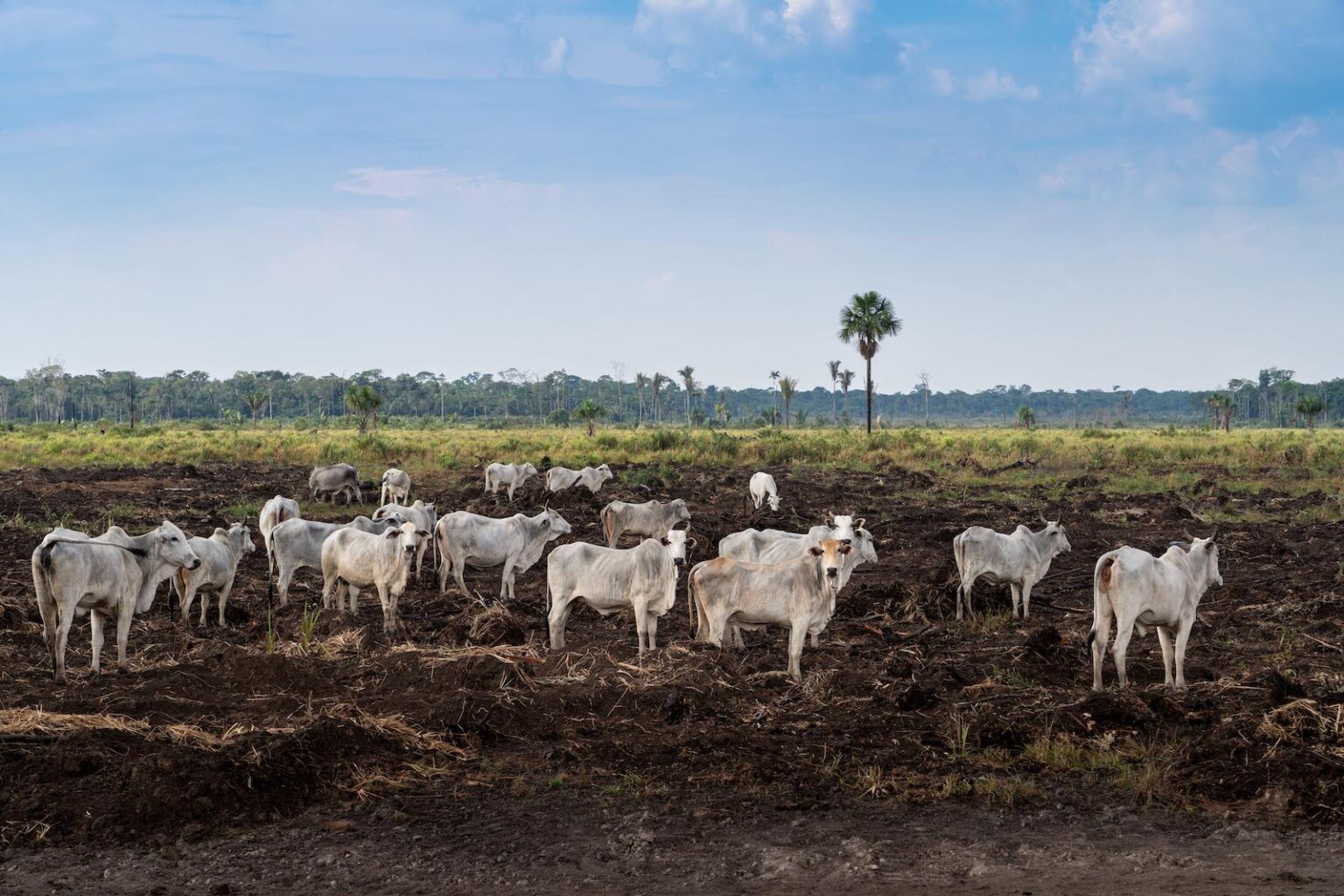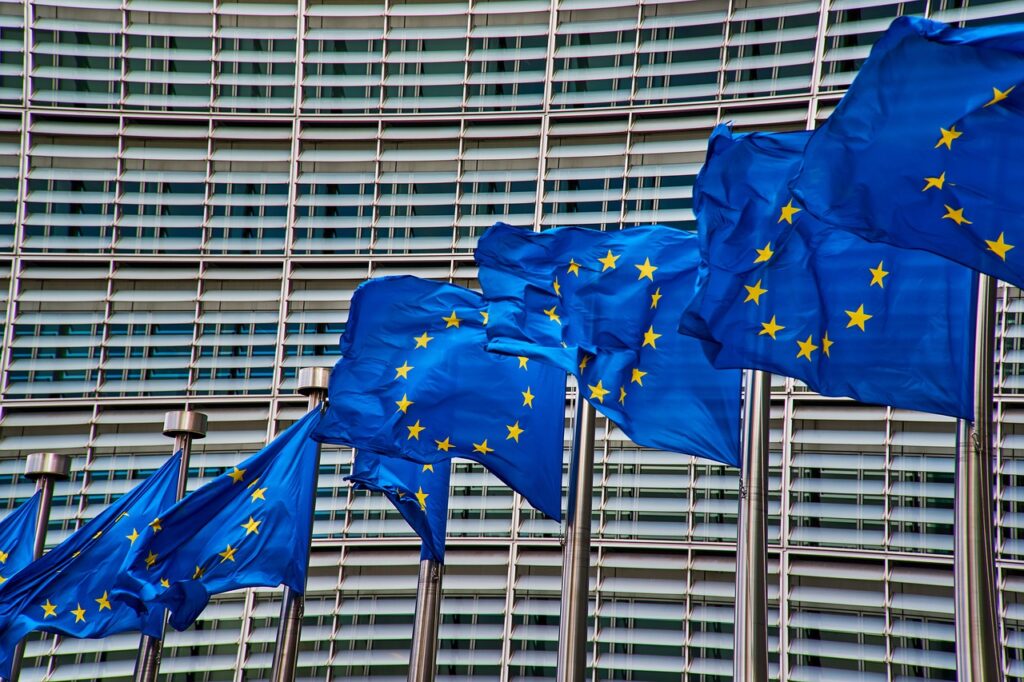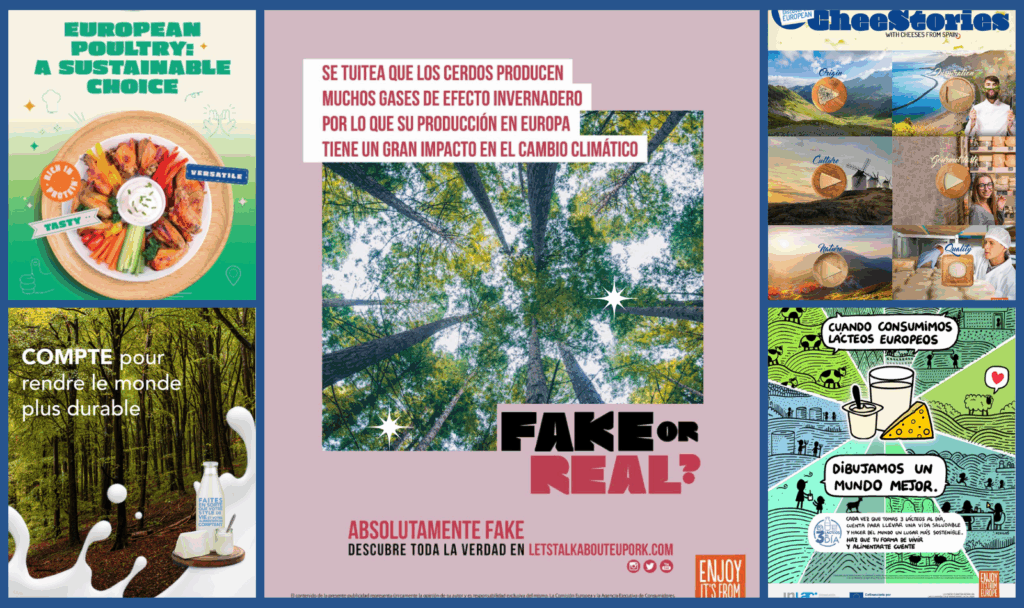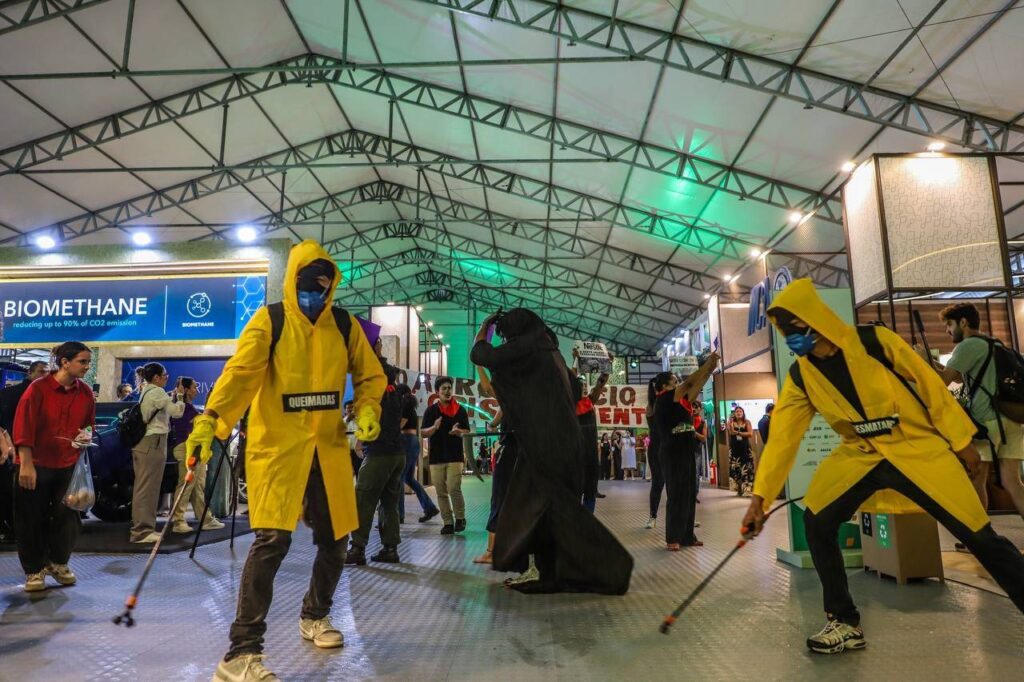Food firms are inflating their climate targets with carbon removals and weak deforestation claims, according to a report from the NewClimate Institute and Carbon Market Watch.
With the COP30 climate summit in Brazil later this year widely expected to focus on agriculture, the report has raised concerns about high levels of corporate greenwashing and a lack of climate credibility in the global food sector.
The report finds that food giants Nestlé, JBS, PepsiCo, Mars and Danone are overstating progress against their climate goals, which avoid cuts to methane emissions from livestock and fertiliser use in favour of vague promises of carbon removal and weak no-deforestation claims.
Scientists have warned that agriculture and food companies must urgently tackle their large carbon footprint to bring global climate change under control. Agriculture is responsible for a quarter to a third of all emissions, as well as being the leading driver of deforestation and ecosystem loss worldwide.
The annual report, which analysed the climate strategies of five of the world’s top 10 food and agriculture corporations, is the latest in a slew of reports that show how the largest food companies are failing to tackle their environmental impacts.
A 2023 report from the World Benchmarking Alliance, found that less than half of agriculture companies had set climate targets. A 2024 report showed that where firms have climate goals, they rest on vague undefined terms like “regenerative agriculture”, apply only to a subset of operations and fell short of tying the firms to transformative action.
Food corporations are responsible for a huge share of agricultural emissions overall. An analysis from Greenpeace Nordic from 2024 found the largest 29 meat and dairy companies are responsible for around one fifth of the livestock sector’s total emissions.
Despite pledges from governments to bring down agricultural emissions – levels of the key greenhouse gases driven by farming – carbon dioxide, methane and nitrous oxide – reached record highs in the atmosphere last year.
The emissions of Nestlé – the world’s largest food company – are around three times larger than its home country Switzerland.
Campaigners said the new report showed companies continue to fail to take sufficient action to curb their emissions.
Alex Wijeratna, the senior director of legal and investigations at campaign group Mighty Earth said companies were setting “patchy and unsubstantiated targets” and accused regulators of letting companies off the hook.
“The report shows companies setting more targets to deal with impacts,” said Eve Fraser, a co-author of the report at the New Climate Institute “However, in a critical decade for climate action, there are no strong signals from these companies that they’re moving on key transitions.”
Subscribe to our newsletter
Stay up to date with DeSmog news and alerts
Overreliance on Carbon Removals
The new research suggests companies are relying heavily on natural solutions – such as those that remove carbon from the atmosphere through the soil – to meet their climate reduction targets.
A 2023 study published in the journal Nature found that such removals, often described as “carbon farming” were “not a suitable tool for emissions mitigation”. A 2024 survey of livestock experts found most scientists do not see soil having a large role to play in reducing emissions from animal herds, which produce the majority of farming’s greenhouse gases.
Soil based removals can be undone by floods, fire or other disturbances to the soil, and can be difficult and expensive to measure.
The world’s leading climate science body – the United Nations’ IPCC – says we need drastic reductions to emissions to meet climate goals, and removals should only be used in hard to abate sectors and as a last resort.
Despite this, companies continue to lend a substantial role to removals to meet their climate goals.
Nestlé has said it could use removals for up to 80 percent of its target to halve its emissions by 2030. The world’s largest meat processor, JBS, also plans to rely on an unstated amount of carbon removals.
The report authors calculated that JBS emissions reduction targets are likely to lead to just a 1 percent decrease in emissions by 2030. The report finds no company has a long-term goal for reductions only, and which would exclude removals being counted.
Companies began including removals in their reductions targets in 2023, when the Science Based Targets initiative (SBTi), a leading standard setting body, started allowing them to do so.
Some campaigners have criticised the move by the SBTi as undermining climate efforts. They are now urging the Greenhouse Gas Protocol (GHGP) – another standard setting body – not to follow in the SBTi’s footsteps, when it releases new guidance this year.
Report author Fraser said that while there was a role for removals companies should not include them in their targets.
“It is high risk and not very transparent to be using removals toward reduction targets,” Fraser told DeSmog. “This means a lack of action, for example on methane emissions, might be masked by a focus on removals.”
Alma Castrejon-Davila, a senior campaigner with the Changing Markets Foundation told DeSmog there was a lack of transparency in how and where removals were being claimed.
She pointed to a recent claim from Nestlé that it has reduced methane emissions by 20 percent, but which doesn’t specify whether or how much removals were counted towards that goal.
“Companies need to tell us in a very clear way how they got to those reductions” she said.
Ignoring Methane
The report also raises concern about a worrying lack of action to bring down methane emissions.
Methane is responsible for around a third of global warming to date, and is 80 times more powerful than CO2 when measured over a 20 year period.
The potent greenhouse gas represents 35 percent of agriculture’s total contribution to greenhouse gases; and agriculture emits 40 percent of it, ahead of fossil fuels.
However, as it only lasts only 12 years in the atmosphere, cuts today can mean tangible impacts on temperatures in the next decade.
The Global Methane Assessment – the most comprehensive study of how best to mitigate the greenhouse gas – calculated reductions in methane by 40-45 percent this decade could reduce temperatures by 0.3C by the 2040s.
Despite the crucial role methane plays, the report finds European dairy giant Danone is the only company to have a reduction target for the greenhouse gas.
Danone is also the only company that intends to increase sales of plant-based products by a significant share, the report found, as part of a company-wide strategy to reduce methane, though it has not gone as far as to set a clear target.
None of the five companies analysed in the report – which are the largest five food and agriculture companies by revenue in 2023, excluding those predominantly involved in manufacturing – had a target to reduce livestock – which is responsible for just under a third of methane emissions overall.
Governments agreed to reduce methane by 30 percent by 2030 via the Global Methane Pledge agreed at the COP26 climate summit, but the world is off track – levels of the greenhouse gas continued to rise in the atmosphere last year.
One scientific paper suggested methane emissions from livestock should fall by 61 percent by 2036, while the UN’s IPCC recommends cuts of 40-45 percent to methane emissions by the end of this decade.
Fraser said that methane emissions are failing to tackle methane emissions across the board. “When it comes to methane, some companies are not even setting targets, and the report shows there’s a lack of both transparency and ambition in this area,” she said.
Castrejon-Davila said the poor performance echoed the results of a benchmarking study Changing Markets had published on the dairy and coffee sector earlier this month, where the highest scored, Danone, received 59 out of 100.
“We definitely would like to see more companies setting ambitious and science-based targets to cut these emissions, and these targets should also be backed by serious action plans,” she said.
“We really would like to see the other companies analysed in this report, such as Nestlé and JBS, setting a methane reduction target of at least 30 percent by 2030.”
Deforestation
Agriculture is the chief driver of forest loss and protecting the world’s forests will be a key theme of the 2025 climate summit, COP30, which will take place in the Amazon region of Brazil.
According to a 2023 study published in Nature, land use and land-use change account for approximately 38 percent of global food system GHG emissions, more than any other part of the sector.
But while the report finds all companies’ have pledged to halt deforestation to some degree, commitments are weakened by loopholes and a lack of clarity on implementation, it says.
JBS’ commitment does not all of its indirect cattle suppliers, for example, which account for a significant amount of its supply chain.
Danone, Mars, Nestlé and PepsiCo fared better, as they have targets covering all direct and indirect suppliers by 2025 and commitments on some or all high-risk commodities where deforestation is most prevalent.
However, the report finds these have loopholes including limited coverage of some commodities, particularly on cocoa, where Nestlé for example, is off track, and Mars has not yet set an end-date.
Several in the industry have argued that providing full traceability across their business – which will be a key theme at COP – is too hard a goal to realise.
Alex Witjeratna, a senior campaigner with Mighty Earth, said there were relatively cheap and efficient ways to trace products, including with satellites.
“There’s lots of different ways to get traceability, but the first one is a genuine willingness to open up your supply chain to scrutiny all the way down to the total grassroots,” he said.
Governments should help, he argued, by backing regulations such as the EU Deforestation Regulation (EUDR), which would require companies to show they have traced all key commodities in their supply chain, and to prove they did not come from deforested land.
The EU has delayed the implementation of the EUDR in the face of significant lobbying from many companies and producer countries, and there are now fears the regulation may be further delayed or scrapped entirely.
In addition to this, the report called for separate targets for reductions versus removals, gas-specific targets for methane, nitrous oxide and carbon dioxide, and a ban on untraceable deforestation claims.
Witjnerata said companies had spent ten years of “drift and distraction” on their targets, but said there were emerging legal risks of inaction. He pointed for example to an ongoing lawsuit French supermarket Casino for failing to act on illegal deforestation in its supply chain as one of a number of cases holding companies to account for impacts.
Castrejon Davila said the report highlighted the limits of voluntary action : “With this and many other reports we see that action is not happening by the private sector regulating itself.”
All companies mentioned in this report were contacted for comment.
Subscribe to our newsletter
Stay up to date with DeSmog news and alerts







